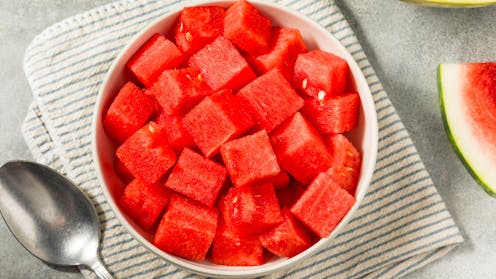
With summer in full swing, many people will be tempted by supposedly miraculous dieting tricks to lose those excess kilos that prevent them from enjoying the perfect physique. Among them are so-called “mono diets”: restrictive regimes that consist of exclusively eating one type of food for a period of time, with the aim of quickly losing weight and “detoxing”.
Popular examples include pineapple, apple, watermelon, peach or artichoke, as well as grain-based options like rice and protein-based ones such as tuna or milk. Their appeal lies in the promise of simplicity and fast results.
Fleeting weight loss
Diets built on a drastic reduction of calorie intake can lead to swift weight loss. However, consuming such a small amount of calories means reduced blood sugar levels. In order to maintain energy levels, our bodies have mechanisms that compensate for a drop in nutrient intake.
Initially, the body uses hepatic glycogen, the main source of the glucose reserve that maintains blood glucose levels, especially between meals or when fasting. However, once this store is depleted, the body begins to convert muscle mass to obtain amino acids which, through other metabolic routes, can produce glucose. This process, sustained over time, can lead to a significant loss of muscle mass and other metabolic disturbances.
Much of any sudden weight loss is therefore the result of a loss of water and muscle mass rather than body fat, meaning these results tend to be temporary. When a person returns to their usual diet after a strict regime, it is common for them to quickly regain any lost weight – this is known as the “rebound effect”.
In short, mono diets may seem like a quick fix, but they do not promote sustained weight loss, nor are they conducive to healthy eating habits.
Are there any benefits?
Beyond the initial weight loss, there is virtually no scientific evidence to suggest that mono diets have any real or lasting benefits. Some people report a feeling of “lightness” or better digestion, but these effects may be due more to the elimination of certain processed foods than to the diet itself.
The “detox” element of mono diets can also have a placebo effect. The belief that they are somehow cleansing their body can make a person feel better, even in the absence of any proven physiological changes.
Are they dangerous?
Mono diets can be very dangerous, especially if they are prolonged. The main risk is the deficiency of essential nutrients, as by eating only one type of food, we miss out on the proteins, healthy fats, vitamins and minerals that the body needs to function properly. In addition, they can lead to digestive problems, metabolic disorders, musculoskeletal problems, hormonal disturbances and electrolyte imbalances, especially in people with pre-existing health conditions.
Another significant danger is the creation of an unhealthy relationship with food, one marked by restriction and guilt. In extreme cases, this can lead to eating disorders such as orthorexia or anorexia nervosa.
Additionally, radically limiting nutrients can affect the balance of neurotransmitters in the brain, contributing to irritability and fatigue which, in turn, negatively impact emotional well-being.
Why are they so popular?
Despite their risks, mono diets continue to be successful, especially on social media. Their appeal lies in their simplicity and the promise of quick results with minimal effort. In addition, many of these diets are promoted by celebrities or influencers, giving them a false sense of credibility. Misinformation, aesthetic pressure and a broader lack of nutritional education are also contributing factors.
The key takeaway is that single-food diets may be effective for quick and temporary weight loss, but they are not effective in the long term, and are dangerous if followed for long periods of time. They provide no real health benefits, and can lead to nutritional deficiencies and major health problems.
For these reasons, they are not recommended, and should not be promoted as appropriate forms of weight control or health improvement. The best way to reach and maintain a healthy weight is still a balanced, varied diet, accompanied by regular physical activity and healthy lifestyle habits.
Ana Montero Bravo no recibe salario, ni ejerce labores de consultoría, ni posee acciones, ni recibe financiación de ninguna compañía u organización que pueda obtener beneficio de este artículo, y ha declarado carecer de vínculos relevantes más allá del cargo académico citado.
This article was originally published on The Conversation. Read the original article.







